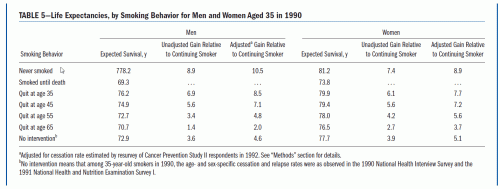This is the fourth in a series of posts looking more closely at quantifying the impacts of smoking cessation; earlier posts:
- Dad can you stop smoking and not die? Sept. 13, 2011
- Smoking cessation-I: as compared to what? Sept. 19, 2011
- Smoking cessation-II: selection effects Sept. 21, 2011
There was a great deal of data and analytical work behind the development of the model that allowed us to simulate different smoking counterfactuals to provide estimates of the life extension gained from smoking cessation. This effort does not change the key question: what is the appropriate counterfactual?
Table 5 from the paper lays out the life extensions from the counterfactuals we estimated, all of which could be combined to tell different stories:
Using 35 year old male smokers to illustrate, we identified 6.9* life years gained if he quit smoking at 35 and did not relapse. The comparison we highlighted was:
- 35 year old smoker continues smoking until his death, on average at age 69.3
- Compared to the counterfactual expected age at death of 76.2 if he quit at age 35 (76.2 – 69.3 = 6.9 years)
But, is that the correct counterfactual?
- We also estimated the counterfactual life expectancy of a 35 year old smoker whose smoking status (continuation, cessation, relapse) followed the population-observed averages, with death predicted at age 72.9.
If this is used as the counterfactual, then the life extension due to smoking cessation is 3.6 years (72.9-69.3) years instead of 6.9. Quite a difference. In the paper, we highlighted what is essentially the high water mark of life gains from cessation by comparing the life expectancy of a 35 year old smoker who quits to one who continues to smoke until death. Epidemiologically speaking though, some of those smokers who do not to quit at 35 later do so, so perhaps the counterfactual we highlighted was too optimistic, at least compared to the average behavior of a 35 year old smoker.
The exact same model produced both results, the only difference is the counterfactual chosen, and the story being told. Which is the correct one? It is rare that the most important questions are easy.
*This is life extension unadjusted for smoking misclassifciation.
Donald H. Taylor, Jr, Vic Hasselblad, Jane Henley, Michael J. Thun, Frank A. Sloan. Benefits of Smoking Cessation for Longevity. American Journal of Public Health 2002;92(6):990-996.


